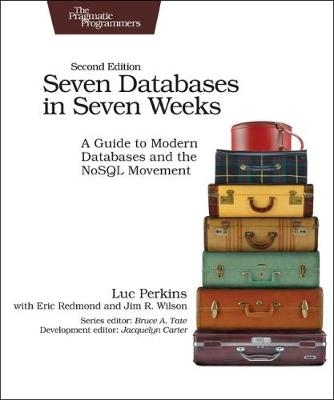
Seven Databases in Seven Weeks
A Guide to Modern Databases and the NoSQL Movement
Seiten
2018
|
2. Auflage
Pragmatic Bookshelf (Verlag)
978-1-68050-253-4 (ISBN)
Pragmatic Bookshelf (Verlag)
978-1-68050-253-4 (ISBN)
Data is getting bigger and more complex by the day, and so are your choices in handling it. Explore some of the most cutting-edge databases available - from traditional relational databases to newer NoSQL approaches - and make informed decisions about challenging data storage problems. This is the only comprehensive guide to the world of NoSQL databases, with in-depth practical and conceptual introductions to seven different technologies: Redis, Neo4J, CouchDB, MongoDB, HBase, Postgres, and DynamoDB.
This second edition includes a new chapter on DynamoDB and updated content for each chapter. While relational databases such as MySQL remain as relevant as ever, the alternative, NoSQL paradigm has opened up new horizons in performance and scalability and changed the way we approach data-centric problems. This book presents the essential concepts behind each database alongside hands-on examples that make each technology come alive. With each database, tackle a real-world problem that highlights the concepts and features that make it shine.
Along the way, explore five database models - relational, key/value, columnar, document, and graph - from the perspective of challenges faced by real applications. Learn how MongoDB and CouchDB are strikingly different, make your applications faster with Redis and more connected with Neo4J, build a cluster of HBase servers using cloud services such as Amazon's Elastic MapReduce, and more.
This new edition brings a brand new chapter on DynamoDB, updated code samples and exercises, and a more up-to-date account of each database's feature set. Whether you're a programmer building the next big thing, a data scientist seeking solutions to thorny problems, or a technology enthusiast venturing into new territory, you will find something to inspire you in this book.
What You Need: You'll need a *nix shell (Mac OS or Linux preferred, Windows users will need Cygwin), Java 6 (or greater), and Ruby 1.8.7 (or greater). Each chapter will list the downloads required for that database.
This second edition includes a new chapter on DynamoDB and updated content for each chapter. While relational databases such as MySQL remain as relevant as ever, the alternative, NoSQL paradigm has opened up new horizons in performance and scalability and changed the way we approach data-centric problems. This book presents the essential concepts behind each database alongside hands-on examples that make each technology come alive. With each database, tackle a real-world problem that highlights the concepts and features that make it shine.
Along the way, explore five database models - relational, key/value, columnar, document, and graph - from the perspective of challenges faced by real applications. Learn how MongoDB and CouchDB are strikingly different, make your applications faster with Redis and more connected with Neo4J, build a cluster of HBase servers using cloud services such as Amazon's Elastic MapReduce, and more.
This new edition brings a brand new chapter on DynamoDB, updated code samples and exercises, and a more up-to-date account of each database's feature set. Whether you're a programmer building the next big thing, a data scientist seeking solutions to thorny problems, or a technology enthusiast venturing into new territory, you will find something to inspire you in this book.
What You Need: You'll need a *nix shell (Mac OS or Linux preferred, Windows users will need Cygwin), Java 6 (or greater), and Ruby 1.8.7 (or greater). Each chapter will list the downloads required for that database.
Luc Perkins is a customer success engineer at Reflect Technologies, a data reporting and visualization startup in Portland, OR. In the past, he has worked as a technical writer for companies such as Twitter and Basho, and is actively involved in the Write the Docs community of technical writers.
Eric Redmond has been in the software industry for more than 20 years, working with Fortune 500 companies, governments, and many startups. He is a coder, illustrator, international speaker, and active organizer of several technology groups.
Jim R. Wilson is a software engineer at Google creating data visualizations on the Big Picture team. He's contributed to TensorFlow's visualization suite, TensorBoard, and other open source projects.
| Erscheinungsdatum | 16.05.2018 |
|---|---|
| Verlagsort | Raleigh |
| Sprache | englisch |
| Maße | 194 x 232 mm |
| Gewicht | 622 g |
| Einbandart | kartoniert |
| Themenwelt | Mathematik / Informatik ► Informatik ► Datenbanken |
| Mathematik / Informatik ► Informatik ► Theorie / Studium | |
| ISBN-10 | 1-68050-253-0 / 1680502530 |
| ISBN-13 | 978-1-68050-253-4 / 9781680502534 |
| Zustand | Neuware |
| Informationen gemäß Produktsicherheitsverordnung (GPSR) | |
| Haben Sie eine Frage zum Produkt? |
Mehr entdecken
aus dem Bereich
aus dem Bereich
Einführung in die Praxis der Datenbankentwicklung für Ausbildung, …
Buch | Softcover (2021)
Springer Fachmedien Wiesbaden GmbH (Verlag)
CHF 69,95


